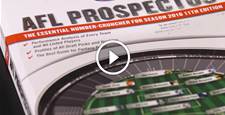We sat the 2013 NRL and AFL title-winning captains down for a chat about all things footy.
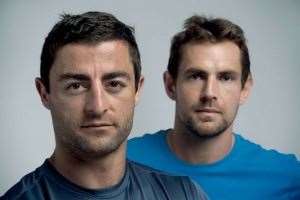 Photo: Warren Clarke.
Photo: Warren Clarke.WHEN YOU’RE THE CAPTAIN, you have to sweat the extra details. It’s not good enough to merely play well – afterwards, there are all the hands to shake and the speeches to give. The title is nice, but it’s not a job for those seeking to avoid unwanted attention. The responsibilities of office have brought together Luke Hodge and Anthony Minichiello, the captains of the reigning premiers in the nation’s two most popular football codes. More accustomed to leading their teams out on the field in front of thousands of people, their duty this day has led them to an unassuming-looking studio space in a light-industrial area of inner Sydney. At the least, mugging and play-acting for the camera is some light relief from the preseason grind: Hodge has escaped the blistering heat that has enveloped Melbourne this week, while Minichiello walks in from his team’s very first day back to work. The gregarious Hodge asks the cheerfully bashful Minichiello about the new baby daughter; both swap stories about off-seasons that have continued to grow ever shorter with the demands of modern football.
The General and The Count, as they’re known, are rather fitting sobriquets for a couple of footballers-in-chief. Hodge has been the head Hawk since 2010, assuming a role he’d been marked out for since he was top pick in the 2001 AFL Draft, then through to winning the Norm Smith Medal in a 2008 grand final victory. One of the game’s foremost controllers of play, Hodge’s leadership qualities were easy to recognise.
Minichiello was handed the Roosters’ captaincy at the beginning of last season, a mark of respect for his service and faith with the club. He was the last on-field link to the Brad Fittler-led teams of the early part of the decade, an Origin and international rep whose career was disrupted by a back injury in 2006 that continued to plague him over the next few seasons. Even with his future in Bondi kept on a year-to-year basis, Minichiello endured. The karmic reward in 2013 was rich: he was wearing the number-one jersey for the NRL’s number-one team.
It was Inside Sport’s fortune to sit down with the two captains ahead of this coming season, and listen to a couple of professionals talk shop. Our roundtable discussion ranged over a variety of subjects: the mindset of defending the championship, whether the best players make the best captains (or not), how you deal with having a star as bright as Buddy Franklin or Sonny Bill Williams in the side. What it amounted to is a classroom session in football leadership.
INSIDE SPORT: Comparing your careers, you both won premierships as younger players before you became captains. Does the premiership you won as a captain mean more, because of the greater role you’ve taken on?
HODGE: I think I was 24 when I won my first one. It was more just exhilaration. You won in front of your family and friends; it was a great feeling. But all you did back then as a younger kid was rock up, train, play the game. There was no thought of anything outside of football at the club. When you become older, in the leadership group or as the captain, you spend 24/7 thinking about tomorrow’s issues that either the club or the coaches are calling out. Or you’ve got team-mates coming up to you about issues that you need to discuss. The amount of time, effort and stress that goes into a season of football – when you win a grand final, it’s a little bit of relief.
IS: Mini, it was particularly early in your career when you won your first premiership.
MINICHIELLO: Yeah, I was 22. Hodgey hit the nail on the head: at that age you just go to training, go home and relax; play the game, then have some fun on the weekend. It doesn’t really sink in at that age. You think you’re just going to keep playing that way for years and years. I’ve played in six grand finals, and I’ve lost four. So that period after 2002, when we lost two in a row, obviously hurt. Then the club dropped a bit, lost players and went through a real rebuilding phase – you actually realise then how hard it is to make a grand final and win it. So last year was special, being captain as well. A lot of things go into preparing for the end result, way before October comes around.
INSIDE SPORT: How much of captaining a football team is leadership by example? What’s the balance of having to manage the team’s issues and being responsible for your own performance?
HODGE: Your own performance is important, but the bigger picture is making sure your team-mates are comfortable. The role of a captain is to be an extension of the coaching staff. If the coaches have an issue, they’ll come to the captain or leadership group and vice-versa with the players. You’re in constant dialogue with both. The main thing as a captain or leader is to make sure the standards are set. You sit down and get the disciplines and behaviours you want to live by as a group. As far as leading by example, if you’re not living by them, the younger guys aren’t going to follow. Any young kid coming up loves a beer and having a good time – as an older player, you need to realise the most important thing is setting the right example.
IS: Do either of you characterise yourselves as vocal leaders, or more by example?
MINICHIELLO: It’s important to develop both of those skills. To have a voice when it’s needed, and to know when it’s enough talk and get out and do the business. You’re always just trying to keep it ticking over, and keeping everyone on the same page is very important. If you have a weak link, you can harm the team.
IS: A lot of guys make up a footy team – I’ve always wondered, would you have a personal relationship with every player on the team?
HODGE: We’ve got 45, 47 guys on a list. That’s a big part of leadership – delegating. You’re not going to get along perfectly with 45 or 47 blokes. You try your hardest, but you can delegate to other leaders.
MINICHIELLO: That’s the thing with a leadership group: you’ve got to have good support around you, other good leaders; a guy who may take that one for you, or he knows that other guy better than you.
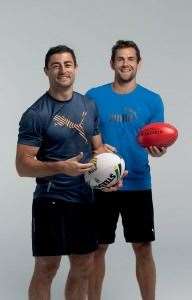 Photo: Warren Clarke.
Photo: Warren Clarke.INSIDE SPORT: Hodgey mentioned being an extension of the coaches – Alastair Clarkson is a fixture at Hawthorn, while Trent Robinson was in his first year in the role, although he has deep links to the Roosters. In that relationship, is it more workable if the personality of the captain matches the coach’s, or is it more a case of them being complementary? Also: there are a lot of assistant coaches running around these days. How do they fit in?
HODGE: We’ve had our coach for ten years, and coaches go through their own pathways. When they come in, they want to do it their way. As they get older and adapt, they rely a lot more on their assistant coaches. We changed something this year – we had Clarko come to every leadership group meeting we had. That was great as far as the relationship between the coach and the senior players, because a lot of times you leave a message for someone, but you’re not sure how the coach is going to hear it. We had better conversations. Sometimes they were heated, but that’s the best part of a footy club. Everyone is passionate about their sport. It’s the best thing we did, bringing Clarko in, spending more quality time with the senior guys.
IS: Robbo’s entry into the job seemed quite seamless, particularly compared to how Brian Smith’s tenure came to an end. Was it as seamless as it looked?
MINICHIELLO: It was, because Robbo played for the Roosters back in ’97. I actually played with him (laughs). He knows the history and culture of the club, and that’s always the first thing when you come in – if you want to have a strong work ethic and be consistent, not just all year but over a number of years, it’s important to know the history of the club. We had a lot to do, because our club is young-ish, and quite a few guys didn’t know much about the history of the club. He put those steps in place, and our culture is starting to grow. He’s got strong assistant coaches around; it’s not just “Yes, Robbo.” It’s a team effort.
INSIDE SPORT: You’re both one-club men, up until now. The media and the fans love that, but how important is it to players? And does assuming the mantle of captaincy deepen that bond with the club?
HODGE: Aussie rules is a bit different to the NRL, where you guys have been able to move to other clubs more easily in the past. Growing up (with the AFL), when you came to one club, it was always like you had to stay at the one club. Unless they got rid of you or you had a falling-out, there was no easy way to leave. It’s a bit different now in the AFL; it’s coming a bit more into the game – Brendon Goddard (St Kilda to Essendon) played in two grand finals two years prior, then Buddy Franklin (Hawthorn to Sydney) just won a grand final. Up until a few years ago, you'd never even think of changing clubs. Ten years from now, to be a one-club man will probably mean a lot more because players are moving around a lot more. To look at the club boards and see the blokes like Michael Tuck, who played 427 games ...
MINICHIELLO: Unbelievable.
HODGE: ... and even when they said “move on”, I think he still wanted to keep playing. What a passion for football. We’ve got some great people around our club: Jason Dunstall, Leigh Matthews. To be around those blokes, it’s a great thing to be with one club your whole career.
MINICHIELLO: I’m definitely proud to be a one-club player. I arrived at the Roosters when I was 16, and I’ve never thought of leaving, either. It is a bit different in league: you can negotiate contracts whenever you feel like; we don’t have a draft. It’s just been a great relationship; it feels like a home. To be at a club for 18 years is something I’ll look back on and think, “That’s special.”
HODGE: I think it’s safe to say we’ll be the blokes they’re going to have to wheel out ...
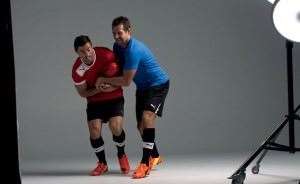 Photo: Warren Clarke.
Photo: Warren Clarke.INSIDE SPORT: Your respective sides last year each contained the biggest star in the comp: Sonny Bill Williams at the Roosters, Buddy Franklin for the Hawks. What was your experience of leading a side with such a high-profile figure in it?
Hodge [to Minichiello]: Yours, mate.
MINICHIELLO: (laughs) Sonny’s probably one of the most recognisable players in the world, in anything. But to be honest, he’s got a great work ethic; a total professional. He doesn’t drink. He puts all of his energy and time into being a professional. Obviously the media loves a story on him, but when he comes into your circle, you really don’t read too much into what the media says. We know what Sonny brings to the team, what his work ethic is, and everyone loves him for that. We’re happy to have him on board again. It was quite easy; we didn’t have to manage him at all.
IS: I know you might be reluctant to speak about someone who is now an ex-team-mate, but how about a thought about the intense celebrity of AFL stars in Melbourne?
HODGE: No, not at all. The Melbourne media is chaotic, and anything that Gary Ablett or Chris Judd or Buddy does, the media flocks to them. One thing about being a captain to someone who the media is trying to get to all the time is trying to make sure they put themselves in the right position; don’t go to the spots where there’s going to be bad news about them. Buddy, he came in as a raw kid of 17, 18, and he’s copped media since he was young. The amount he’s matured on-field and off in the last five years – now he’s up in Sydney, people are always going to be around – has been huge. He’s probably one of the main reasons we won the flag last year.
IS: It’s kind of human nature to be drawn to a big personality – maybe not so much for the older guys in the team. But can the younger guys be affected by playing with the big star?
HODGE: When you’ve got so many blokes there, you’re hanging out with someone different every second day. You’ve got your tighter guys you’ve known for a long time, but with so many blokes in our locker-room, there’s not just the one group that hangs together.
IS: At the Roosters, you have that coffee club going. The fact that Jared Waerea-Hargreaves is right at the front of that seems quite funny ...
MINICHIELLO: We’ve always been called the latte set. We actually laugh at it; JWH does love a latte ... Our group is pretty tight, everyone mixes with everyone. That’s one of the reasons we went so good last year; we came together as a team. We had some late signings, but we were all on the same page. We were great mates off the field, and it really goes a long way when you’re hurting and you need to find something on the field.
HODGE: That’s it; it’s not about the most talented team. It’s about the group of team-mates that aren’t going to put themselves before the team. If you’ve got blokes playing sacrificial roles for the good of the team, that will win any day over a bunch of blokes who are talented but playing for themselves.
INSIDE SPORT: As footballers, you have players you look to on the way up. Do you have captains, or even leaders outside of football, that you emulated?
MINICHIELLO: I played under Brad Fittler, who was a great captain. He was always on the money when he stepped on the field. He demanded the best out of everyone on the park, so that was a great learning curve, playing with him. I also played with Joey Johns and Darren Lockyer, two other great captains ...
IS: A point here: the guys you’ve mentioned are all great players. When you’re playing with a captain who is that great, is there a dynamic of “I can’t possibly do what he does”? Or do you get dragged along by how good they are?
MINICHIELLO: Lockyer was a great example. He was so smooth as a player, he didn’t really have to say too much off the field. He kept quiet, led by example on it, and people followed. He was great in that sense.
IS: Luke, what about that theory of the captain not necessarily being the best player at the club, but perhaps the fifth-best player whose effort will tend to push the other guys?
HODGE: When we had Shane Crawford, he was never the most vocal person off the field, but how he attacked training and games was just so professional. Then we had Richie Vandenberg – Crawf was this freak athlete compared to Vanders, who was a workhorse. Richie retired in 2007, the year before our premiership, but a lot of that was credited to the hard work he did. He was captain when Clarko came in; we were in the bottom part of the ladder, and a lot of the structure he set up, you could definitely credit what happened in 2008 to the hard work that he went through as captain but missed out.
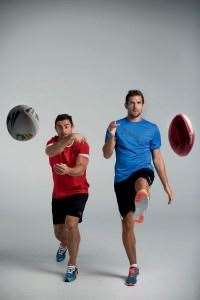 Photo: Warren Clarke.
Photo: Warren Clarke.INSIDE SPORT: We love to ask with these crossover situations: how much of each other’s code do you watch?
MINICHIELLO: I watch a bit of AFL because we train in the same complex as the Swans. So I know a lot of those boys, and they’re all good guys. I follow the Swans and see how they’re progressing during the season. We have an ex-Swannies player, Tadhg Kennelly, who does a bit of catching work with the outside backs. There’s a bit of cross-connection.
HODGE: In the last two or three years, I’ve started to watch a bit more rugby league. We’ve got a lot of blokes who come from NSW and Queensland who are right into it. A lot of the locker-room talk getting toward the weekend is not only AFL but rugby league as well. The Storm having a few successful years has really built it in Melbourne.
MINICHIELLO: It’s been good for rugby league in Melbourne. The Storm has kept that consistency going and created a lot of fans down there.
HODGE: If you would’ve asked most people in Melbourne a few years ago to name ten rugby league players, they probably couldn’t. But now: Billy Slater, Cooper Cronk, Cameron Smith ... They’re in the papers as much as the AFL.
IS: We have this situation where the AFL club in Sydney and the league club in Melbourne are admired for their organisational culture. As members of similarly successful clubs, is there a sense of professional admiration looking across?
MINICHIELLO: For sure. Especially in Melbourne. Obviously the people there love their sport, and their club membership is where it’s at. Hodgey’s team, they’ve got massive member numbers. We’re trying to promote that in league, and each year, each team grows.
IS: Your sponsor, Puma, has brought you together to promote their new footy boot, which has a neat design concept to it – like the barefoot running, this boot is based on the idea of being able to flex your foot in a way that’s like barefoot kicking. As you were growing up, did either of you learn kicking barefoot?
HODGE: I grew up in the country, so I spent half my time out the backyard in bare feet. One of the main things as a footballer is you need to feel comfortable. These boots, they feel like you’re wearing nothing, they’re that light and comfortable. When you kick the footy, they come off very nicely.
MINICHIELLO: I grew up on acres as well; my dad built football posts for me in the backyard. But the grass was pretty long, so I was always wearing boots. I’ve been with Puma for a while now, and these are the comfiest boots I've worn, the EvoPowers. Back in the day, boots used to be heavy and stiff and hard on your feet. These boots are definitely built for speed.
IS: A back’s boots, then?
MINICHIELLO: Yeah, although if you ask Jared Waerea-Hargreaves, he’ll be wearing them.
INSIDE SPORT: Looking at the year ahead, going from hunter to hunted, does that affect the mentality?
HODGE: It doesn’t. Training for second – if you go into a preseason thinking you’re going to be the hunted because you’re the top team, you’ll drop back down to where you were in previous years. If you’re satisfied with where you are, you’re not going to get anywhere.
MINICHIELLO: I agree a hundred percent. Every year, every team gets better. If you’re satisfied with the year you had, and you don’t push yourself to get better individually and as a team, you’ll drop back into the pack. That’s the challenge – no one has gone back-to-back in the last 20 years in the NRL, so we have a good challenge in front of us. We’ve spoken about it already, and we’ve had to step it up and train even harder.
IS: As competitors, have you looked back on seasons or parts of seasons where you’ve been better than in the premiership years, but still haven’t won because that’s just the way sport is?
HODGE: In 2012, we had a patch from about round 13 to 21, something like that, where I’ve never seen or been in a side that played footy as good as we did then. Then we lost the flag against Sydney. We probably played the better football, but things ... as Mini said, everything just has to fall into line. All your team-mates have to do the right thing at the right time. And luckily enough, we did that in 2013. But I reckon we played better football at certain stages the year before ...
IS: Mini, surely you have similar feelings about one of those years with the grand final losses?
MINICHIELLO: Yeah, in 2003, I reckon we had the most consistent team in the comp. We had some good battles with Penrith that year, but we thought we were the best team in the comp and should have won the grand final, definitely. At the end of the day, full credit to them, they outplayed us and they won. That was disappointing at the time, and then to back it up the next year and lose against the Bulldogs by only three points ... To be the most consistent team all year and then to see that it could go either way ... But that’s the thing. It’s so hard to just get to the grand final in the first place, so to win it, you’ve definitely got to have everything fall into place on the day.
IS: When you hand off the captaincy to the next guy, whoever that will be, what piece of advice would you give along with it?
HODGE: The first thing: don’t try and do it all by yourself. The first mistake I made my first year was coming in after Sam Mitchell, who had been an outstanding captain before myself. He tried to step away and let me do things my own way. If I could do it again, I would’ve had him right there helping me from the start. He came back into the leadership after the first year, and I felt that much more comfortable. I had plenty of coffees with him to get ideas, but to have him in our meetings helped a lot. But I would say whoever gets the job after me, don’t do it all yourself. Rely on the leaders around you.
IS: Mini, you have to come up with a completely original answer.
MINICHIELLO: (laughs) But what he said is so true. You can’t take the whole burden on yourself, because a lot of things go into the season. You need a good leadership team to help you through it. If you feel like you don’t need to speak up and say anything, don’t just speak because you have the “C” next to your name. Say something when you mean it. I’d only captained the Roosters a few times through my career and last year was the first full-time. We had great leadership from our coaches, which filtered down through myself and the leadership group. As I said before, being on the one page is so important; that communication from the staff is what you need.
IS: Extra final question ...
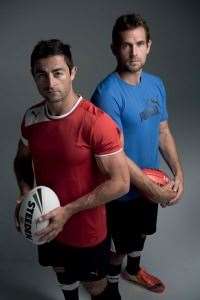 Photo: Warren Clarke.
Photo: Warren Clarke.HODGE: You journos always do that. “This is the last one.”
IS: What’s your general assessment of this coming season?
MINICHIELLO: Yeah, for us at the Roosters, it’s not about looking at long-term goals. It’s not about saying we want to make the grand final and setting our sights on that. It’s more about taking a lot of small steps that happen before the end of the season arrives, so we have to make sure we concentrate on every day, and then the next. Then we just roll along to the next week.
HODGE: Your goal is always to improve on the last year. You’ve got KPIs (key performance indicators) throughout the season that you aim for: blokes running better times, better skinfolds, or whatever those markers are. You can sit down and go through them: there are four, five, six teams that on any given day, especially if they get the right run coming into the finals, any one of those sides are capable of winning. As far as the season, the AFL is as open as it’s been for a number of years.
Related Articles
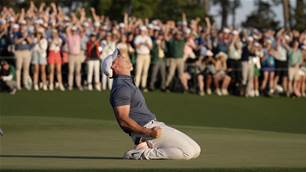
Feature Story: Moving the Needle
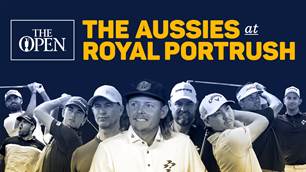
The Aussies at The Open
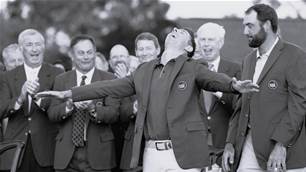

.png&h=115&w=225&c=1&s=1)





